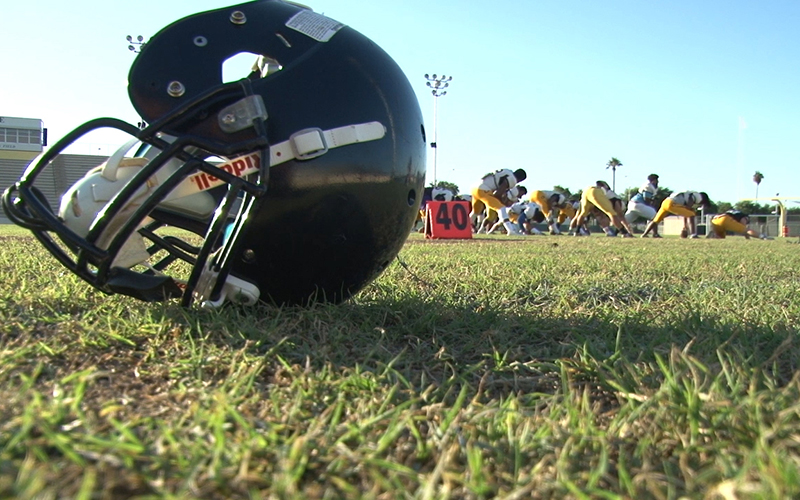PHOENIX – Balancing academics and athletics is a delicate juggling act, but Phoenix College wide receiver and former Joy Christian School quarterback Matthew Mitchell excelled at both – while also dealing with an inhibiting disease.
The Phoenix native was named one of five National Football Foundation National High School Scholar-Athlete Honorees in October. He will travel to New York City early next month to be honored at the NFF Chapter Awards Luncheon. Matthew had a 4.46 GPA and won a state championship at Joy Christian.
“It was really exciting,” Matthew said. “My dad actually tried to call me during biology class because he was really excited about it and he called me twice and I was like, ‘Oh, man, he knows I have class,’ so I was worried that it was an emergency or something.
“It’s a lot of work I’ve put in over the years, both on and off the field. It’s been a grind.”
Matthew is the only honoree from a state west of the Mississippi River and the only one playing at the junior college level.
“I actually didn’t think I would get to the national level, but to actually get to that level and being here at Phoenix College is huge for me,” Mitchell said.
There is one other thing that separates Mitchell from the other recipients – he is playing the game with cystic fibrosis.
A person with cystic fibrosis has a build up of mucus on the lungs, pancreas or other organs.
“Everyone has mucus over their organs but ours is a lot thicker and stickier mucus because of the lack of salt in it,” Matthew said.
It can cause shortness of breath, infections in the chest and respiratory problems.
Matthew has a cystic fibrosis of the lungs and pancreas.
His father, Tom, learned that Matthew had cystic fibrosis three days after his birth, when Matthew underwent exploratory surgery for a blockage in his intestines.
“When the doctor came out from that surgery he said it was about 95 percent indicative of cystic fibrosis,” Tom said. “We had no idea what cystic fibrosis was.”
There is no cure for cystic fibrosis. However, with proper treatments and routines those with cystic fibrosis can now live longer than they previously could.
Matthew’s parents did not reveal his diagnosis for years. They did not want coaches or teachers to treat him differently than his peers.
“I came out with my story my junior year of high school and talking about how I play football with cystic fibrosis and kind of the athletic life with cystic fibrosis,” Matthew said.
Matthew said cystic fibrosis has not hindered his football career, but his accomplishments have helped others with the disease.
“We lost a playoff game,” Matthew said, “and I was really disappointed. A girl named Sydney made a sign for me telling me I was an inspiration to her and that impacted me because I realized I do have an impact on the CF community even though I’m just one person playing football.”
Matthew’s involvement in sports started at a young age because his parents wanted him to be active and did not let his cystic fibrosis diagnosis stop him.
“He started swim team very young,” his father said. “He started a lot of other sports but didn’t know if he would be able to develop to play football. That’s a whole different world and a lot of other issues with football.”
But football was in Matthew’s blood. His instinct was to tackle.
“My dad got me a catcher blow-up doll and the first thing I did was tackle it,” Matthew said. “So, my dad knew from that point on that football was an interest for me.
“I started with flag football because my dad didn’t want me in too much contact and worked my way up to tackle.”
Symptoms of cystic fibrosis include malnutrition, poor growth and and inability to put on weight. However, despite all the risks Matthew is able to play collegee football because his parents established a routine for his treatment when he was younger. Matthew handles his own treatment now along with his doctor.
“When he was very young, we kept him on a real regimented routine in terms of nutrition and his treatment,” said his father. “We did everything we could to get as many calories as we could in him, which meant a lot of shakes.”
But now football has become a part of his treatment.
“What helps me out is actually being on the field,” Matthew said. “A lot of the conditioning, running that gets my lungs working and I am able to push out the mucus.”
Football is something Matthew loves, which makes it easier for him to stay focused on but the academic side requires more work.
“I really love football and love being out on the field, so that’s something that comes naturally to me,” Matthew said. “Academics were something that I really had to work on at such a young age and I’ve kind of found my groove with it.”
Matthew’s award recognizes his success in the classroom and on the football field.
“He overcomes obstacles, a lot of people can’t do that,” his father said.
